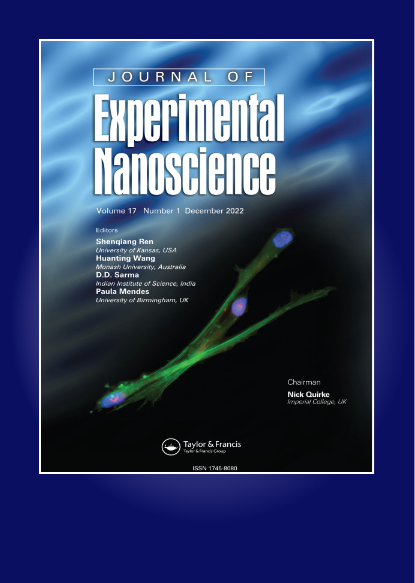RETRACTED ARTICLE: Preparation of hollow Aux-Cu2O nanospheres by galvanic replacement to enhance the selective electrocatalytic CO2 reduction to ethanol
IF 2.6
4区 材料科学
Q2 CHEMISTRY, MULTIDISCIPLINARY
引用次数: 4
Abstract
Abstract Electrocatalytic CO2 reduction to fuel is one of the important ways to solve energy and environmental problems. In this work, the preparation of hollow Aux-Cu2O electrocatalyst and the performance of electrocatalytic CO2 reduction to ethanol were studied. Hollow Cu2O nanospheres were prepared by a soft template method, and Aux-Cu2O composites were prepared by galvanic replacement. The characterization results of XRD and XPS reveal that Cu+ is the main chemical state of Cu in the catalysts. The results of electroactive surface area demonstrate that the electroactive surface area of Au0.51-Cu2O is the largest. The performance evaluation of electrocatalytic CO2 reduction shows that the Faraday efficiency of H2 on Au0.51-Cu2O is the lowest (∼19.5%) and the Faraday efficiency of ethanol can reach ∼18.8% at −1.2 V vs. RHE. Compared with hollow Cu2O nanospheres, Aux-Cu2O catalysts have an earlier onset for ethanol production and promote the CO2 reduction to ethanol with high efficiency, while the hydrogen evolution reaction is significantly inhibited. Our study demonstrates an effective approach to develop Cu-based electrocatalysts favourable toward ethanol in electrocatalytic CO2 reduction.电取代法制备空心氧化铜纳米球,提高CO2电催化还原乙醇的选择性
摘要电催化CO2还原为燃料是解决能源和环境问题的重要途径之一。本文研究了中空Aux-Cu2O电催化剂的制备及其电催化CO2还原为乙醇的性能。采用软模板法制备了中空Cu2O纳米球,并用电流置换法制备了Aux-Cu2O复合材料。XRD和XPS表征结果表明,Cu+是催化剂中Cu的主要化学态。电活性表面积的测定结果表明,Au0.51-Cu2O的电活性比表面积最大。电催化CO2还原的性能评估表明,H2在Au0.51-Cu2O上的法拉第效率最低(~19.5%),乙醇的法拉第效率在−1.2时可达~18.8% V与RHE。与中空Cu2O纳米球相比,Aux-Cu2O催化剂对乙醇生产的起始时间更早,并高效促进CO2还原为乙醇,同时显著抑制析氢反应。我们的研究证明了开发有利于乙醇电催化CO2还原的铜基电催化剂的有效方法。
本文章由计算机程序翻译,如有差异,请以英文原文为准。
求助全文
约1分钟内获得全文
求助全文
来源期刊

Journal of Experimental Nanoscience
工程技术-材料科学:综合
CiteScore
4.10
自引率
25.00%
发文量
39
审稿时长
6.5 months
期刊介绍:
Journal of Experimental Nanoscience, an international and multidisciplinary journal, provides a showcase for advances in the experimental sciences underlying nanotechnology and nanomaterials.
The journal exists to bring together the most significant papers making original contributions to nanoscience in a range of fields including biology and biochemistry, physics, chemistry, chemical, electrical and mechanical engineering, materials, pharmaceuticals and medicine. The aim is to provide a forum in which cross fertilization between application areas, methodologies, disciplines, as well as academic and industrial researchers can take place and new developments can be encouraged.
文献相关原料
公司名称
产品信息
百灵威
Sodium citrate
¥19.00~¥4200.00
希恩思
isopropanol
希恩思
Chloroauric Acid
|
99.0%
希恩思
Deuterium Oxide
|
99.79%
希恩思
Potassium bicarbonate
|
99%
希恩思
Ascorbic acid
|
98%
希恩思
Hexadecyl trimethyl ammonium Bromide
|
97.0%
百灵威
Sodium borohydride
|
98%
阿拉丁
Sodium hydroxide
 求助内容:
求助内容: 应助结果提醒方式:
应助结果提醒方式:


